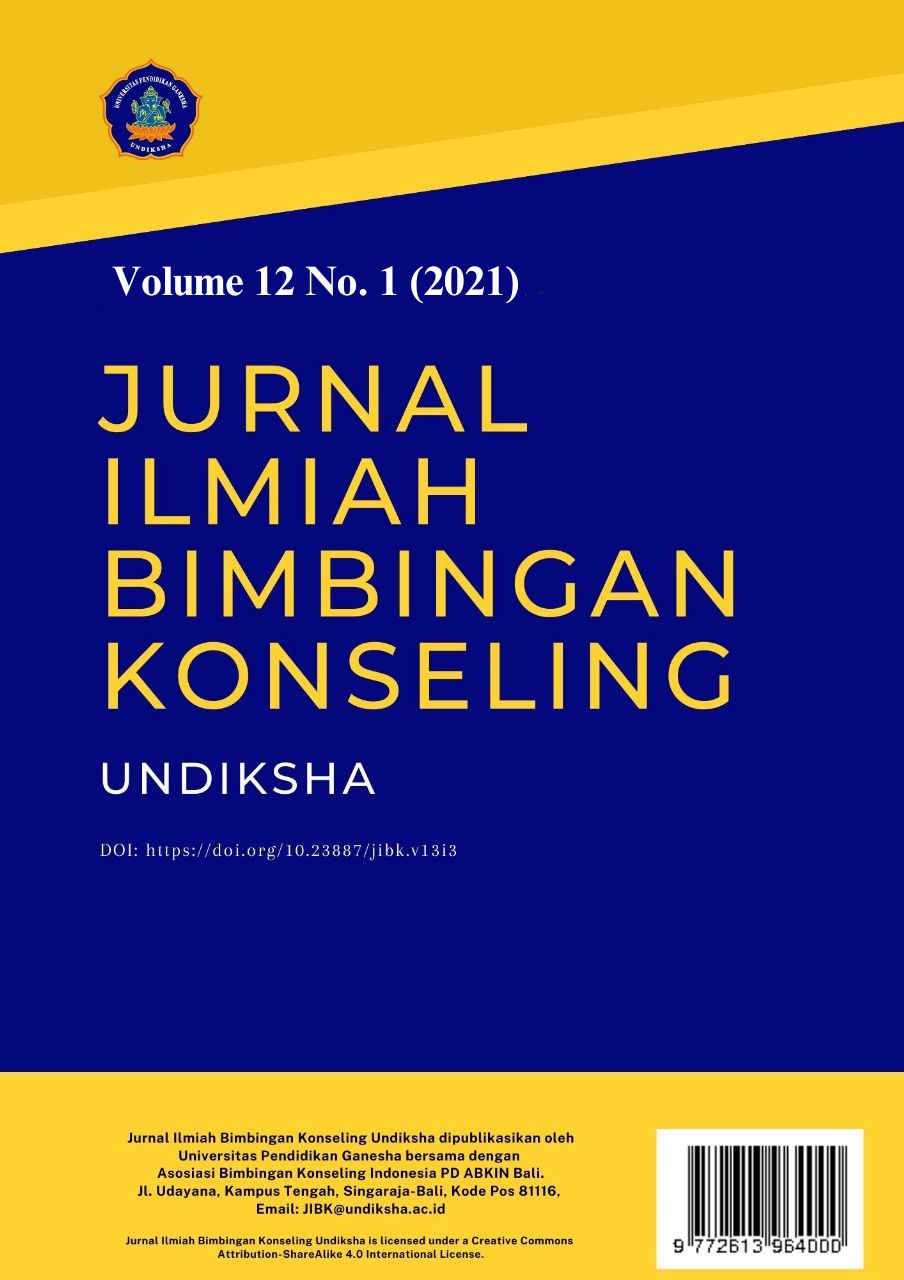Resiliensi dalam Badai: Belis dan Fenomena Kekerasan dalam Rumah Tangga di Kabupaten Alor
DOI:
https://doi.org/10.23887/jjbk.v12i1.33110Keywords:
resilience, belis, Domestic ViolenceAbstract
Abstract: Belis is a marriage tradition that is still a problem in the household. The men who have paid all the belis from the woman's side and made the women their wives, then they treat their wives when they go to the stage of violence. This study aims to determine the resilience of wives of victims of domestic violence due to belis and its impact on wives of victims of domestic violence. This study uses a qualitative research method with a phenomenological approach. The results of this study identified aspects of resilience, namely emotional regulation, impulse control, optimism, problem cause analysis, empathy, self-efficacy, and achievement. The three participants can overcome the problem of domestic violence they experience and are able to survive in situations such as receiving violence from their husband, and from the experiences they have experienced they can overcome problems in their household.Indonesian Abstract. Belis merupakan tradisi perkawinan yang masih menjadi masalah dalam rumah tangga. Para pria yang telah membayar semua belis dari pihak wanita dan menjadikan wanita sebagai istri mereka, kemudian mereka memperlakukan istri mereka ketika mereka menuju tahap kekerasan. Penelitian ini bertujuan untuk mengetahui ketahanan istri korban KDRT akibat belis dan dampaknya terhadap istri korban KDRT. Penelitian ini menggunakan metode penelitian kualitatif dengan pendekatan fenomenologi. Hasil penelitian mengidentifikasi aspek resiliensi yaitu regulasi emosi, pengendalian impuls, optimisme, analisis penyebab masalah, empati, efikasi diri, dan prestasi. Ketiga peserta dapat mengatasi masalah KDRT yang dialaminya dan mampu bertahan dalam situasi seperti menerima kekerasan dari suaminya, dan dari pengalaman yang dialaminya dapat mengatasi permasalahan dalam rumah tangganya.
References
Anonim. (1978). Adat Istiadat Daerah Nusa Tenggara Timur. Proyek Penelitian dan Pencatatan Kebudayan Kebudayaan Daerah. Jakarta: Departemen Pendidikan dan Kebudayaan
Creswell, J. (2017). Research Design Pendekatan Metode Kualitatif, Kuantitatif dan Campuran. Penerbit Pustaka Pelajar.
Dala, Sarah Adelia Umbu (2019) RESILIENSI PADA ISTRI KORBAN KEKERASAN DALAM RUMAH TANGGA. Skripsi thesis, Universitas Mercu Buana Yogyakarta.
Dawan, A. (2019). Perempuan Alor di Pusaran Budaya Belis : Sebuah Pendekatan Etnografis Melalui Revitalisasi Budaya. Inada, 2(1), 25–41. https://doi.org/http://dx.doi.org/10.33541/ji.v2i1.1037 DOI: https://doi.org/10.33541/ji.v2i1.1037
Fatmasari, Anita Dewi (2015) Hubungan resiliensi dengan stress kerja anggota Polisi Polres Sumenep. Undergraduate thesis, Universitas Islam Negeri Maulana Malik Ibrahim Malang.
Fransiska, N., & Novita, H. (2018). Tradisi Perkawinan Masyarakat Insana Kabupaten Timor Tengah Utara, 8(1). Retrieved from https://simki.unpkediri.ac.id/mahasiswa
Keye, M. D., & Pidgeon, A. M. (2013). Investigation of the Relationship between Resilience, Mindfulness, and Academic Self-Efficacy. Open Journal of Social Sciences, 01(06), 1–4. https://doi.org/10.4236/jss.2013.16001 DOI: https://doi.org/10.4236/jss.2013.16001
Kursharyadi, Slamet., Kutitipkan Damai Untukmu “Bunga Rampai Revitalisasi Budaya Alor”, Wahana Visi Indonesia, 2014
Luthar, S. S (2003). Recilience and Vurnerability, Adaptiton in the Context of Chilhood Adversities. Cambridge: Cabridge University Press.
Mahmudah, S. (2010). KDRT (Kekerasan Dalam Rumah Tangga) dan pemberdayaan perempuan dalam bidang ekonomi. Skripsi. Fakultas Psikologi Universitan Islam Negeri Maulana Malik Ibrahim Malang. Retrieved from http://eprints.umk.ac.id/6115/4/2_KDRT.
Ramadani, M., & Yuliani, F. (2017). Kekerasan Dalam Rumah Tangga (KDRT) Sebagai Salah Satu Isu Kesehatan Masyarakat Secara Global. Jurnal Kesehatan Masyarakat Andalas, 9(2), 80. https://doi.org/10.24893/jkma.v9i2.191 DOI: https://doi.org/10.24893/jkma.v9i2.191
Reivich, K., & Shatte, A. (2002). The resilience factor: 7 Essential Skills Or Recorming Life Inevitable Obstacles. New York; Broadway Books.
Richardson, G. E. (2002). The Meta Theory Of Resilience And Resiliency. Journal of Clinical Psychology, 58, 307-321. DOI: https://doi.org/10.1002/jclp.10020
Sciortino, R., & Smyth. (1997). Harmoni: Pengingkaran Kekerasan Domestik di Jawa. Jurnal perempuan, Edisi: 3, Mei-Juni.
Suprayogi, W (2014). Belis Menembus Zaman Belis Menembus Waktu, Edisi: 3, 83-90.
Suyanto, B. (2018). Berbagi Pengalaman Kearifan Dan Kepedulian Dalam Merevitalisasi Budaya Belis Masyarakat Alor. Sebuah Pengantar. Surabaya: Departemen Sosiologi FISIP Universitas Airlangga.
Utami, C. T., & Helmi, A. F. (2017). Self-Efficacy dan Resiliensi: Sebuah Tinjauan Meta-Analisis. Buletin Psikologi, 25(1), 54–65. https://doi.org/10.22146/buletinpsikologi.18419. DOI: https://doi.org/10.22146/buletinpsikologi.18419
Downloads
Published
Issue
Section
License
Jurnal Ilmiah Bimbingan Konseling Undiksha is an Open Access Journal. The authors who publish the manuscript in this journal agree to the following terms:
JIBK is licensed under a Creative Commons Attribution 4.0 International License. This permits anyone to copy, redistribute, remix, transmit and adapt the work provided the original work and source is appropriately cited.
This means:
Jurnal Ilmiah Bimbingan Konseling is licensed under a Creative Commons Attribution 4.0 International License.
(1) Under the CC-BY license, authors retain ownership of the copyright for their article, but authors grant others permission to use the content of publications in JIBK in whole or in part provided that the original work is properly cited. Users (redistributors) of JIBK are required to cite the original source, including the author's names, JIBK as the initial source of publication, year of publication, volume number, issue, and Digital Object Identifier (DOI); (2) The authors are the copyright owner of the article, and the author grants the JIBK held the first publication right.









.png)

.jpg)
